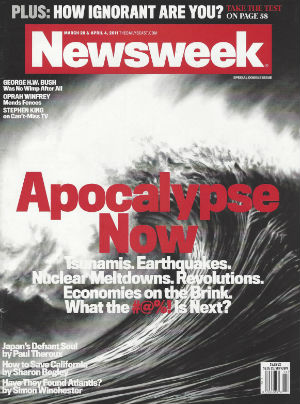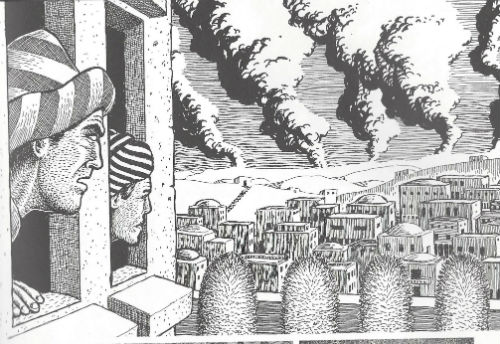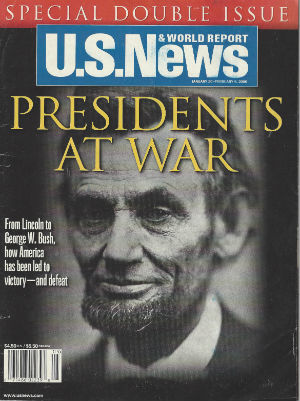A World in Disarray – Habbakuk’s Answer
By Neil Earle
 Even today's media turn Biblical in describing our sometimes troubled times.
Even today's media turn Biblical in describing our sometimes troubled times.In 2010 my deacon, Tom Adams, and I were standing around the coffee pot after church at the time the BP oil spoil was growing worse and worse.
“The news…is AWFUL!” the usually easy-going Tom expostulated.
“You are so right,” I replied.
It has hardly gotten any better since then.
The three attacks on Paris and Brussels in the last year have stunned the world. Now Nice, a place many of us have visited and a scene as far from terror as you might imagine. But look at the disarray in this decade alone.
Apocalypse Now?
– In 2011 came the tsunami and nuclear meltdown in Japan with the U.S. West Coast wondering how far the contaminated matter might spread.
– Newsweek of March 28-April 4 2011 followed up with a cover of a tidal wave and a few other worries thrown in – earthquakes, revolutions, and economies on the brink. Glaring across the cover was the phrase “Apocalypse Now!”
– Somewhere in the midst of the next year or so North Korea’s shot off missiles to scare and intimidate their neighbors Japan and South Korea. The Wall Street Journal reported on April 1, 2016 “U.S., Allies Focus on Nuclear Threat.”
– In 2014 Russia grabbed the Crimea in a naked display of power and soon after began nibbling way at the Ukraine. This was after Russia, England and the U.S.A. had guaranteed the country’s sovereignty in the 1990s. Russian dissident Gary Kasparov just released a blunt attack on Putin’s ambitions titled “Winter is Coming.”
– Hard to believe but ISIS and its beheadings only emerged in 2014 followed by terrorist activity in Paris (twice in 2015), San Bernardino and Brussels.
What is happening? ”Has the world gone crazy?” asks a leading New York editorial.
Well, no. At least not yet.
 Great powers led by seemingly heedless leaders are still a feature of the international scene – then and now.
Great powers led by seemingly heedless leaders are still a feature of the international scene – then and now.Watchful, Not Traumatized
Discouraging world events affect God’s people as well as everyone else. We learned in the 1970s that bad news makes everyone feel bad and today there is seemingly no escape from the 24/7 torrent of bad headlines disturbing our daily equilibrium.
But believers in God and the Bible have great resources at hand. In the prophecies of the Old Testament there were people just like us who wondered if the world had gone careening off its axis and if stability could ever return. They fought through the worrying miasma in the face of siege, famine and deportation. One of these men was Habakkuk and his little book sandwiched between Nahum and Zephaniah makes very topical reading for our stormy times.
Habakkuk actually anticipated and summarized the one true answer to facing the bad news of the world yet living a godly life with peace and integrity while not minimizing the pain and fear millions feel.
In The Anchor Bible author Francis Anderson sums up Habakkuk’s times, the early 600s BC. “He was a man trying to make sense of experience,” says Anderson. “Not traumatized but watchfully waiting, (he) refused to deny the existence of evil (while) leaving the outcome to God.” By wrestling with God in prayer, says Anderson, he expanded his worries and concerns and lifted their frame of reference to the international sphere into lessons for all time. He also left a legacy of hope and encouragement for all time.
Let’s see what makes Habakkuk’s book a message for today.
The Vital Background
Habakkuk lived at a time when major international shifts were erupting on the world of his day, the Ancient Near East. Big power Assyria was declining, Babylon was the rising power and everyone in the Middle East wondered what this would mean. Events soon escalated:
612 BC Babylon destroys Nineveh, capital of Assyria
605 Babylon defeats Egypt, raids Jerusalem
597 Babylon besieges Jerusalem
586 Jerusalem and Judah led off into captivity
 Hababkuk knew hostile Chaldean armies would soon invade his city and homeland.
Hababkuk knew hostile Chaldean armies would soon invade his city and homeland.Habakkuk wrote early in this period. We know that because when he protests and cries out to God about the violence and atrocities in his own country of Judah God responded with a startling answer. That’s in Habakkuk 1:1-11. “Don’t worry Habakkuk, I see what’s happening in Jerusalem. I am going to send the Chaldeans against my people and they will punish them for their horrific violence and illegalities. “
Now this answer to his prayer and complaint send the prophet into a tizzy.
“But God you can’t do that. The Chaldeans – the leading tribe among the Babylonians – are worse than our own lawless people. They treat nations callously, like deep sea fishermen killing only for sport. Not only that but their worship of stupid idols is legendary” (Habakkuk 1:12-17).
God’s answer staggers Habakkuk. But he is a man of God and he knows what to do:
“I will stand at my watch and station myself on the ramparts; I will look to see what he will say to me, and what answer I am to give to this complaint.” This is poetic prophetic language for, “I’m going to pray about all this!”
God’s Second Answer
“Complaint” is an operative word in this little book. And although God hears his servant out he also takes him into his confidence. God says he will send five woes against these very Chaldean upstarts. “Woe to him who builds a city with bloodshed and establishes a town by crime! Has not the Lord Almighty determined…that the nations exhaust themselves for nothing? For the earth will be filled with the knowledge of the glory of the Lord, as the waters covers the sea” (2:12-14).
God is telling his faithful prophet – I see it all, I am in charge, no one gets away with anything, I will avenge myself on the Chaldeans in my good time! “Now it is your turn, Babylon” (2:16). You can take this to the bank, God is saying, the Chaldeans will be punished in their turn.
This is of great comfort to Habakkuk. But before he pronounces five woes on the Chaldeans (2:6, 9, 12, 15, and 19) God has given Habakkuk a key to his surviving these troublesome times. It is given in Habakkuk 2:4, “See he is puffed up, his desires are not right (a godly theme that flits all the pompous dictators who strut briefly across the earth)…but the righteous will live by his faith.”
“The righteous will live by his faith.”
There’s Habakkuk’s answer. And this formula stands for all time. The New Testament quotes this reply three times. Habakkuk will have to trust that God knows what he is doing. Trust that he is the moral governor of the universe. Trust that somehow justice will yet be done.
Halley’s Bible Handbook defines this biblical faith as “the ability to feel so sure of God that no matter how dark the day, there is no doubt as to the outcome.” Bible commentator David Baker says some thing similar: “Faith means a firm confidence in God’s presence even when he seems absent.” And Francis Anderson writes of how “it requires a robust faith to see the good hand of God in the most calamitous events.”
 Our greatest President seemed to feel the hand of God at work even in the midst of horrific civil war.
Our greatest President seemed to feel the hand of God at work even in the midst of horrific civil war.A Rare Example
For the American people their most traumatic national tragedy was by far the disastrous Civil War from 1861 to 1865. But the country was fortunate to be led by a President who could still discern the wise hand of God in the midst of national punishment. In his famous Second Inaugural Abraham Lincoln preached a small sermonette saying that if the ghastly sin of slavery had to be balanced by the blood that was shed in those terrible years, then “the judgments of the Lord are true and righteous altogether.” Lincoln was quoting the Bible, a book he pondered often.
One of Habakkuk’s lessons learnt was that God is a God of justice and he promises to balance all the scales in the end. The undeserved suffering at Fukushima, Sandy Hook, Paris, Brussels and San Bernardino are not outside his perview. He sees, he knows, he cares and he promises that one day immense good will come out of the tragedies and fears we face, just as President Lincoln was certain that preserving the Union was worth any sacrifice, including his own life, as it turned out.
The stunning vision Habakkuk recorded in Chapter 3 was meant to assure him and all of us, his readers, that God well knows how to intervene in his good time. This spectacular vision is based on God’s deliverance of Israel from Egypt in the time of Moses and Joshua (3:13). It also looks ahead to Jesus Christ returning in power and glory to rule the nations when every knee will bow to him.
This vision of God’s dynamic intervention consoles Habakkuk no end. ”God is still on the job.” His ending is peaceful and calm thanks to the blessed assurance faith in the true God brings: “Though the fig tree does not bud, and there are no grapes on the vines…yet I will rejoice in the Lord, I will be joyful in God my Saviors. The Sovereign Lord is my strength…he enables me to go on the heights” (Habakkuk 3:17-19).
“Thank God for God,” one church leader has said. It is a sentiment Habbakuk would certainly share.
‘Deserve Victory’: Ten Against Terror
Reports from Nice, France remind us once again that we are in an age of terror. But being proactive reduces anxieties. The Bible’s counsel is “faith without works is dead” (James 2:20). Since 9/11 in our Glendora church we have been teaching these points compiled from community agencies regarding terrorist threats. There are things we can do as private citizens to reduce the threat:
1. Local police are still your first responders. If you suspect anything unusual the police at 9-1-1 are the first to contact.
2. Be careful with ID, passports, and other personal documents – terrorists fervently seek out other identities.
3. Guard your credit cards, loose cash, and avoid suspicious charities. Cutting off funding is a prime anti-terrorist tactic.
4. Consider the Three Day Rule: first responders often advise us to have emergency food and water on hand, walking shoes and a flashlight near the bed…just in case!
5. Be aware and have your children aware of main switches for shutting off water, gas and electrical power.
6. Report anything unusual at work or on public transport – suspicious packages, untended vehicles parked illegally.
7. At work make someone specifically responsible for security. Having people briefed on stairwells, emergency alternate exits, etc. made a difference for those escaping the Twin Towers on 9/11.
8. Talk to our children – calm their fears. Stress that only four out of some 5000 planes aloft on 9/11 were hijacked. That is, the odds of being safe even on that day were exceptionally high.
9. “Deserve Victory.” The British applied this during four years of heavy bombing and terror by night (1940-1944). Don’t let the threats disrupt normal plans and activities.
10. Get to know and love your immigrant neighbors. Terror threats in both Canada and the UK have been prevented after timely tip-offs from within the Islamic community.
We seem to live in more dangerous times. But we can all have part in helping ourselves and our neighbors deserve victory.